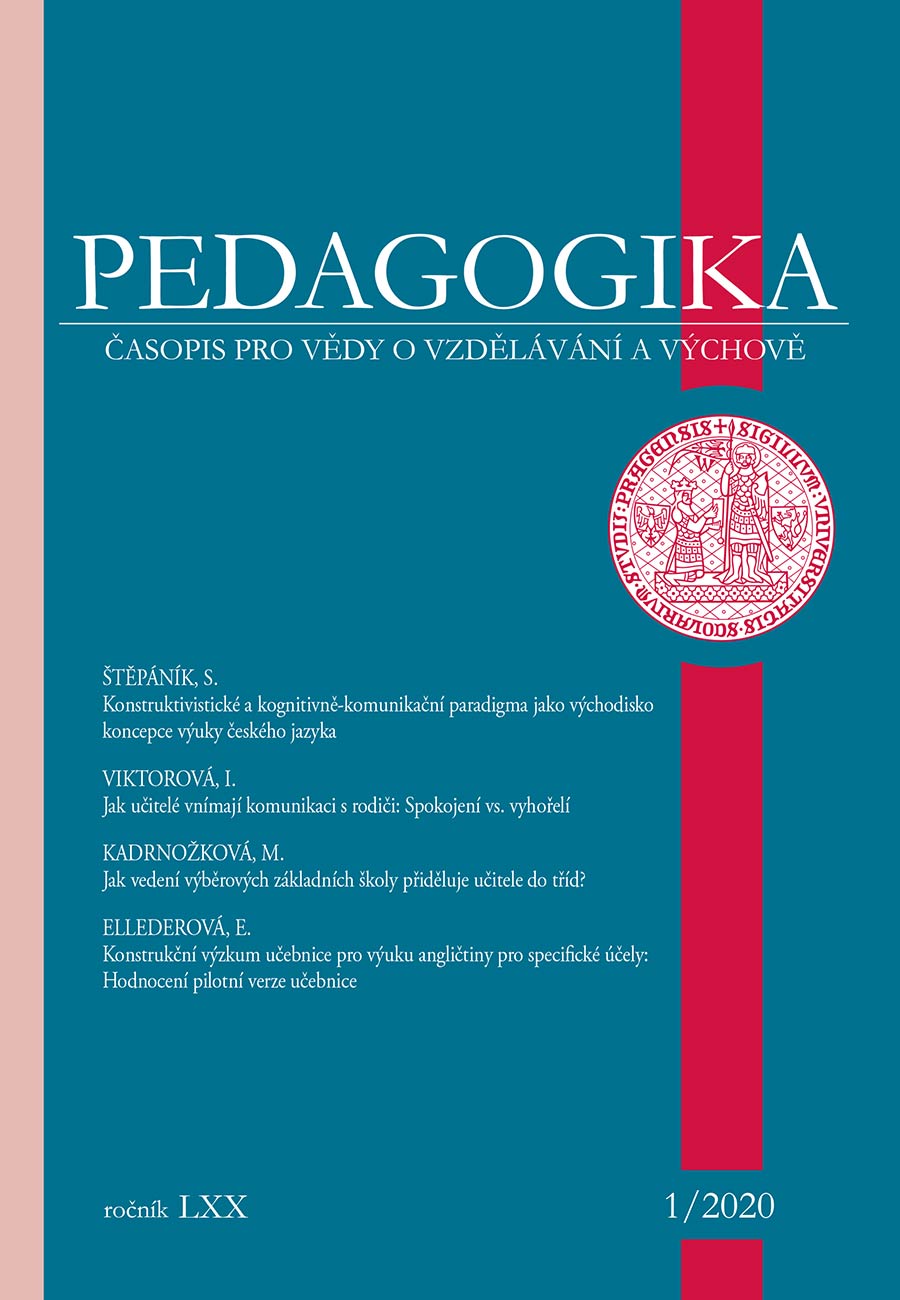A Constructivist and Cognitive-Communicative Paradigm as the Basis of the Conception of Czech Language Instruction
DOI:
https://doi.org/10.14712/23362189.2019.1355Keywords:
transdisciplinary didactics, Czech language didactics, Czech languageAbstract
The theoretical study deals with the problem of creating a learning environment which determines the quality of Czech language (L1) instruction. The elaboration of the problem is grounded in the integration of the semantic-logical structure of the content interconnecting the language and the communicative components of the subject. First, the study describes the general theories of the current state of Czech instruction, with a special focus on the relation between the scientific field (linguistics) and the school subject (or instruction). Next, it analyses the difficulties which the existing conception of Czech language instruction creates, and it scrutinises their causes. The problem is viewed from the perspective of both transdisciplinary didactics and disciplinary didactics of Czech language teaching. Finally, as a solution, the paper puts forward an innovative conception of Czech language instruction called Communicative Teaching about Czech Language, defines its sources and specifies its programme.
Keywords: transdisciplinary didactics, Czech language didactics, Czech language, conception of instruction, Communicative Teaching about Czech language, constructivism, tradition, innovation.
References
Burke, R. J., & Greenglass, E. (1995). A longitudinal study of psychological burnout in teachers. Human Relations, 48(2), 187-202.
https://doi.org/10.1177/001872679504800205
Farber, B. A. (1982). Teacher burnout: Assumptions, myths, and issues. Based on a paper presented at the Annual Meeting of the American Psychological Association, Washington, DC. ED 229 36.
Hendl, J. (2005). Kvalitativní výzkum: základní metody a aplikace. Praha: Portál.
Kaščák, O. (2006). Moc školy. O formatívnej sile organizácie. Bratislava: Veda.
Kaščák, O., & Pupala, B. (2011). Škola - statický element v sociálnej dynamike. Úvodní stať. In O. Kaščák & B. Pupala (Eds.), Škola - statický element v sociálnej dynamike (s. 6-14). Bratislava: Iura Edition.
Kebza, V., & Šolcová, I. (2003). Syndrom vyhoření. Praha: Státní zdravotní ústav.
Kebza, V., & Šolcová, I. (2008). Hlavní koncepce psychické odolnosti. Československá psychologie, 52(1), 1-19.
Kremer, L., & Hofman, J. E. (1985). Teachers' professional identity and burn-out. Research in Education, 34(1), 89-95.
https://doi.org/10.1177/003452378503400106
Lasky, S. (2000). The cultural and emotional politics of teacher-parent interactions. Teaching and Teacher Education, 16(8), 843-860.
https://doi.org/10.1016/S0742-051X(00)00030-5
Marek, T., Schaufeli, W. B., & Maslach, C. (2017). Professional burnout: Recent developments in theory and research. Routledge.
https://doi.org/10.4324/9781315227979
PMCid:PMC5797212
Matýsková, D. (2005). Spolupráce rodiny a školy z pohledu rodičů a učitelů. Pedagogická orientace, 15(1), 27-36.
Možný I. (2004). Česká rodina pozdní modernity: nová podoba starého partnera a rivala školy. Pedagogika, 54(4), 309-325.
Pavlas Martanová, V., & Konůpková, O. (2019). Odlišné světy učitelů a rodičů: interakce s rodiči jako zdroj stresu učitele. Pedagogická orientace, 29(2), 223-242.
https://doi.org/10.5817/PedOr2019-2-223
Pulišová, K. (2016). Neklape nám to: učitelé a rodiče žáků prvního stupně základních škol a jejich problémové vztahy. Studia paedagogica, 21(3), 67-182.
https://doi.org/10.5817/SP2016-3-9
Rabušicová, M., Šeďová, K., Trnková, K., & Čiháček, V. (2003). O školách, v nichž jsou rodiče i ředitelé spokojeni se vzájemnou spoluprací. SPFFBU, Studia paedagogica, U8, 103-116.
Rabušicová, M., Šeďová, K., Trnková, K., & Čiháček, V. (2004). Škola a (versus) rodina. Brno: Masarykova Univerzita.
Shirom, A., & Melamed, S. (2006). A comparison of the construct validity of two burnout measures in two groups of professionals. International Journal of Stress Management, 13(2), 176-189.
https://doi.org/10.1037/1072-5245.13.2.176
Smetáčková, I., Viktorová, I., Štech, S., & Ptáček, R. Vztah syndromu vyhoření, copingových strategií a self-efficacy mezi vyučujícími na českých základních školách. Československá psychologie 63(4), 386-401.
Šeďová, K. (2009). Tiché partnerství: vztahy mezi rodiči a učitelkami na prvním stupni základní školy. Studia paedagogica, 14(1), 27-52.
Štech, S. (2007). Profesionalita učitele v neoliberální době. Pedagogika, 57(4), 326-337.
Švaříček, R., & Šeďová, K. et al. (2007). Kvalitativní výzkum v pedagogických vědách. Praha: Portál.
Urbanovská, E. (2017) Vztah rodičů a dětí jako faktor ovlivňující vzdělávání dětí se zdravotním postižením. Paidagogos, 2016(2), 141-153.
Urbanovská, E., & Kusák, P. (2009) Syndrom vyhoření učitelů ve vztahu k vybraným determinantám. E-Pedagogium, IV, 108-121.
Žídková, Z., & Martinková, J. (2003). Psychická zátěž učitelů základních škol. České pracovní lékařství, 4(3), 6-10.



